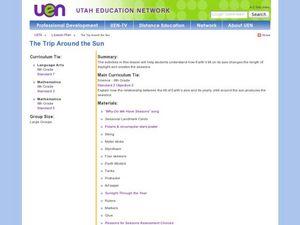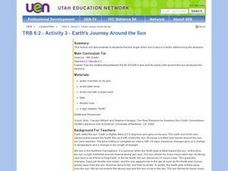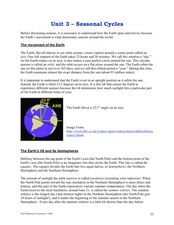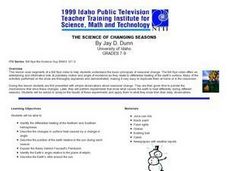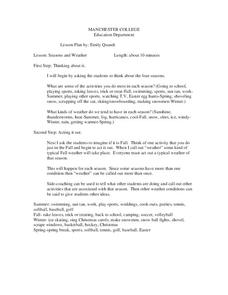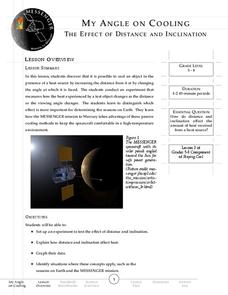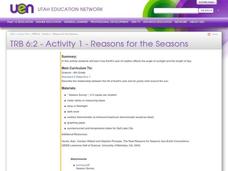Curated OER
Season's Greetings
Students explore Earth's seasons using an interactive website. In this earth science lesson plan, students watch video segments and explain Earth's seasonal milestones. They discuss the factors that causes seasonal changes.
Curated OER
Seasons on Earth
Students examine how seasons occur and explore how the different angles effect surface heating. In this climate lesson students interpret satellite maps of the world that show seasonal differences in plant life.
Curated OER
The Trip Around the Sun
Sixth graders investigate the relationship between the tilt of the Earth's axis and the seasons. In this earth science instructional activity, 6th graders sing the song "Why Do We Have Seasons" and use simulate the Earth's tilt by using...
Curated OER
Earth's Journey Around the Sun
Sixth graders examine how the angle of the sun's rays is a factor in determining the seasons. They watch a teacher demonstration of the concepts and write a paragraph demonstrating their understanding.
Curated OER
The Reasons for the Season
Students explain the reason for the changes in season. In this lesson examining the relationship between the Earth and the Sun, students use an applet to discover how the alignment of the Earth and the Sun cause the change in seasons.
Curated OER
Seasons
Students investigate the reason for seasons on Earth during three activities. They construct a model of the Earth and Sun to identify patterns in the changes of the angle of light on the Earth's surface. Then they conduct a heat...
Curated OER
Seasonal cycles
Students understand that the rotation of the Earth is responsible for the seasons. In this seasonal cycles lesson, students learn how the rotation of the Earth affects the seasons. Students answer questions about the rotation, the...
Curated OER
The Science of Changing Seasons
Students explore basic principles of seasonal change, ponder the mechanisms that drive these changes, and perform experiments that show what causes the earth to heat differently during different seasons.
Curated OER
The Sun in Our Lives
Third graders identify the different parts of the sun. In this astronomy lesson, 3rd graders examine how the sun's energy drive life processes on Earth. They construct a model of a solar system using large rolls of toilet paper.
Curated OER
Seasons and Weather
Learners, in an open forum with the teacher, discuss the four seasons and all the activities they do during each season. They tie in all the different types of weather that is experienced during each season. In conclusion, the students...
Curated OER
Seasonal Cloud Cover Variations
Students, in groups, access data from the NASA website Live Access Server regarding seasonal cloud coverage and the type of clouds that make up the coverage. They graph the data and make correlations between types, seasons and percentages.
Curated OER
Reason for the Seasons
Learners study the seasons of the Earth. In this seasons lesson, students study the science of the seasons on Earth by studying the tilt and axis of the Earth's orbit. Learners read background information and four experimental activities...
Curated OER
Sky Time: On the Astronomical Meaning of the Day, Year and Seasons
Students simulate the movement of the Earth using their body motion. In this earth science lesson, students explain how this causes seasonal changes on Earth.
Curated OER
Earth's Tilt Creates Seasons
Students examine how the Earth's tilt creates the seasons. In this seasons lesson, students study a diagram that shows the rotation of the earth around the sun and how it tilts during the rotation. They answer 4 discussion questions and...
Curated OER
Seasons Worksheet
Middle and high schoolers are given a diagram of the Earth rotating around the Sun. They label the seasons in the proper place, highlight special days such as the vernal equinox and autumnal equinox, the dates the special days fall on,...
Space Awareness
Climate Zones
The climate at the equator is hotter than the climate at the poles, but why? The lesson goes in depth, explaining how the angles of illumination relate to the heating rate at different latitudes and seasons. Scholars use a strong lamp,...
Messenger Education
My Angle on Cooling—Effect of Distance and Inclination
When exploring Mars, spacecrafts are exposed to 5-11 times more sunlight than when near Earth. Groups of pupils complete a hands-on activity to explore how distance and angle of the sun affect temperature. Through discussions, they then...
Scholastic
Lesson Three: The Earth, Movement in Space
If you feel like you're standing still, you're wrong! The Earth is constantly rotating and orbiting under our feet. Demonstrate the Earth's movement within the solar system with a collaborative activity. With a candle or lamp in the...
Alabama Learning Exchange
Seasons
Learners explore the four seasons through literature, art activities and technology and explore how the earth's rotation around the sun results in the occurrence of the four seasons.
Curated OER
Earth and Sun's Distance
Students consider the shape of the Earth's orbit around the Sun. They view the first segment of Science Court video and use Timeliner software to construct a scale of the distance between the Earth and the Sun.
Curated OER
The Seasonal Cycle
Students complete a unit of lessons on the four seasons. They examine the effect each season has on plants, animals, and people during the actual season, read magazine and newspaper articles, and create a calendar and poster about each...
Curated OER
Reasons for the Seasons
Sixth graders conduct and analyze a survey that explores public perceptions about the reasons for seasonal change. They measure the changing length of days, observe shadows and discuss how the Earth's axis of rotation affects the seasons.
Curated OER
Seasons and Shadows: Investigate How Shadows Shift Throughout the Year
Students examine their shadows and why they are different in the summer and winter. In this seasons lesson students complete an activity to see how the earth's tilt on its axis changes the length of shadows.
Curated OER
Ancient Sun Models of the World
Students explain that many different cultures across the world developed their own reasoning for the weather around them. They explore the different cultural beliefs of the sun's cycle and to create their own story of the sun's movement.




